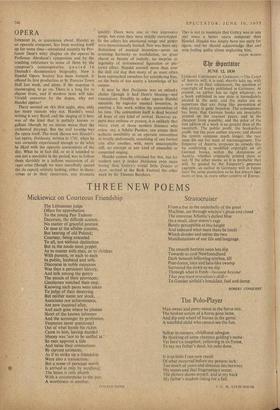INTEREST in, or conscience about, Handel as an operatic composer,
has been working itself up for some time—stimulated recently by Pro- fessor Dent's witty chapter on the operas in Professor Abraham's symposium and by the touching references to some of them by the composer's contemporaries, quoted in Deutsch's documentary biography. Now a Handel Opera Society has been formed. It offered its first production at St. Pancras Town Hall last week, and plans, if the response is encouraging, to go on. There is a long list to choose from, and if modern taste will take Vivaldi concertos by the dozen, why not Handel operas?
There seemed on this first night, alas, only too many reasons why not. Handel's vocal writing is very florid, and the singing of it here was of the kind that is politely known as gallant (though by no means worse than the orchestral playing). But the real trouble was the opera itself. The work chosen was Handel's last opera, Deidamia, written in 1741, when he was certainly experienced enough to do what he liked with the operatic conventions of the day. What he in fact did, or so it sounded to one not a specialist in the period, was to follow them slavishly in a tedious succession of da capo arias (though we were mercifully spared the do capos), entirely lacking, either in them- selves or in their succession, any dramatic
quality. There were one or two expressive songs, but even they were strictly stereotyped. In the others his emotional range and power were monotonously limited. Nor was there any distinction of musical invention—never an arresting harmony or modulation, no great charm or beauty of melody, no surprise or ingenuity of instrumental figuration or pic- torial effect. Handel seemed more than ever the dull old dog that. many of us must often have reproached ourselves for considering him, on the basis of too scanty a knowledge of his output.
It may be that Deidamia was an unlucky choice (though it had Dent's blessing—and translation). Possibly in other operas Handel succeeds, by superior musital invention, in creating a live work within the convention of his time. The convention itself is dead beyond all hope of any kind of revival. However ex- perts may enthuse or protest, it is unlikely that many, even of those modern listeners who enjoy, say, a Schiltz Passion, can attune their iesthetic sensibility to an operatic convention so totally undramatic, consisting of one formal aria after another, with, more unacceptable still, no attempt at any kind of ensemble or concerted singing.
Handel cannot be criticised for this, but for modern cars it makes Deidamia even more boring than Gretry's trivial little Zemire et Awl', revived at the Bath Festival the. other week by Sir Thomas Beecham.
This is not to maintain that Grdtry was in any real sense a better opera composer than Handel. Handel was simply born too early for opera, and we should acknowledge that and stop feeling guilty about neglecting him.
COLIN MASON










































 Previous page
Previous page